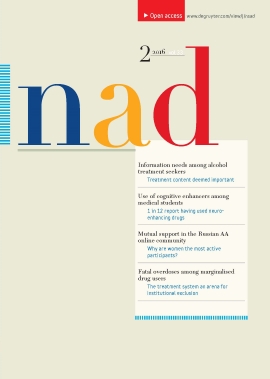NAD 2/2016 (April)

Exploring treatment culture and overdose in Norway
Research shows that the risk of overdose mortality among marginalized drug users is particularly high during the first weeks after discharge from inpatient treatment. Elin Berg investigated whether there might be a connection between marginalization and treatment culture to understand fatale overdoses after discharge from inpatient treatment. The case study is focused on a single individual and his treatment process in Norway. The case shows that there may be a relationship between marginality, treatment culture and overdose mortality. Cultural and structural aspects of the treatment system put subject in an empty and risky situation that probably contributed to his death.
Use of cognitive enhancers among medical students in Lithuania
Aistė Lengvenytė, Robertas Strumila and Jurgita Grikinienė have studied the use of cognitive enhancers among medical students in Lithuania.They wanted to determine the reasons for usage and evaluate the contributing factors such as socio-demographic characteristics, stress levels, sleep quality and knowing somebody who has used a neuro-enhancing drug. In Lithuania, 1 of 12 medical students report having used neuro-enhancing drugs. Male students reported three times higher prevalence rates than females.
Lack of information can be come a barrier for entering treatment
What kind of information do individuals in treatment for alcohol problems find should be available before treatment start? Anette Søgaard Nielsen and Annette Elkjær Ellermann found that by far the most participants rated information about the content of treatment as a priority. Individuals seeking and entering treatment for alcohol problems require information about the treatment itself and what it contains before they start treatment. This is in stark contrast to the kind of information that treatment seekers currently find, such as the opening hours of the treatment centre and similar practicalities. The article is followed with three commentaries by Jessica Storbjörk, Katja Kuusisto and Morten Hesse.
Mutual support and recovery in the Russian Alcoholics Anonymous online community
In Russia the paradigm of alcoholism as a disease is still in contrast to the general perception of alcoholics as weak-willed. Laura Lyytikäinen studied alcoholism and recovery in Russia by looking at the Russian Alcoholics Anonymous online group. The online community creates a space for engagement with AA’s 12-Step program and service work of supporting other alcoholics in recovery in the context of Russia, where face-to-face AA groups and other recovery programmes are scarce. When the state cannot deliver the services for problem drinkers or recovering alcoholics, people may turn to the Internet to find alternative information and social support.
Follow us on social media:


